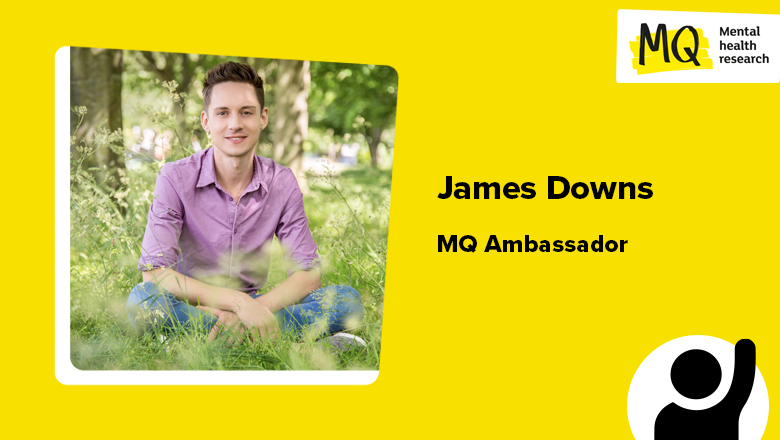[ad_1]
In a series of profiles, we at MQ Mental Health Research would like to introduce to you some of our wonderful MQ Ambassadors. Representing our charity organisation, our ambassadors help to spread the message of what MQ does, why mental health research is so important and lend their voices of lived experience expertise of mental illness.
MQ Ambassador James Downs, a mental health campaigner and researcher, kindly shared his story about why listening to lived experience is vital in the world of mental health research.
James, thank you so much for chatting with us. You’ve contributed to research projects and more for us this past year. How does it feel to contribute your own experiences to MQ’s work?
Over the last year, I have been lucky to take part in some brilliant work with MQ as an Ambassador. From featuring in the brilliant new book, Your Mental Health, to being a part of the ground-breaking Gone Too Soon roadmap, which addresses the causes of premature death amongst those living with mental illness and distress like me. I have felt included and valued as part of a growing team of people interested in mental health research.
More than this, I believe that incorporating the knowledge gained from experiencing a condition really enriches the value of research, which at its best acknowledges that there are many ways of knowing, and each can enhance the other.
As someone with a background in research and lived experience of mental illness, what can you contribute to research that others may not?
In practical terms, I often think of ideas, gaps in evidence, and novel solutions based on experiencing my conditions and being a patient that others within research teams might not think of. I am sometimes a lone voice in suggesting that the ways in which research talks about mental health conditions might not be shared or appreciated by those who experience them.
My litmus test as to whether being included in research means anything is whether my being involved makes a difference, and whether the same outcome would be created were I not to be in the room.
Are there any downsides to contributing to research projects for you personally?
Whilst I value the work that I do and the projects I have been lucky to contribute to, I’ve also learnt that working from the basis of expertise from experience can be taxing. As well as it being hard to know when, how and how much to share your experiences, it’s often tricky to know when you may or may not be representing something broader than just your own experience.
Do you think this would apply to other people interested in taking part in research?
We all have individual, uniquely-situated lives, bound in particular contexts at particular times – so was can I say about my experience that might be relevant to anyone else?
Having lived with particularly stigmatised and poorly understood conditions such as personality disorder and bulimia nervosa, I know there are other people like me when I look at epidemiological data, but I haven’t heard from others like me, or met many of them, least of all read about their experiences and treatment in research papers. I don’t know if others encounter some of the problems in care that I have, or the same misunderstandings, but I often think it worth addressing them just in case anyone does.
Is it challenging when you’re so aware of the gaps in knowledge you are trying to help fill?
When you are attempting to fill a knowledge gap, it is sometimes difficult then to know what the shape of that gap is. The creation of new knowledge might involve shedding light on a whole swathe of issues impacting many people that haven’t been well addressed or even articulated much before. This is the reality of the stage we are at when it comes to mental health science – it is still in its infancy.
Whilst there are wonderful projects happening with more energy than ever before in the field of research, too many people still live their lives in a knowledge gap, and the reality of being unknown is that it can be a terribly lonely and stigmatising place to be.
Why is it so important to involve those with lived experience of mental illness in research?
There is so much we can learn from those who are not yet reflected in the scientific literature, and giving platforms to listen to them and respect what they know to be true about their experience is vitally important – not only for a richer understanding of mental health problems amongst researchers and clinicians, but to redress the experiences of being silenced and feeling unheard in our distress that so many people like me have endured for too long.
Our thanks to James for sharing his story, highlighting just why research matters for mental health and why the work MQ Mental Health Research does must continue.
[ad_2]
Source link
